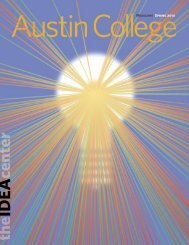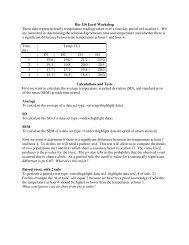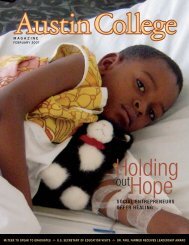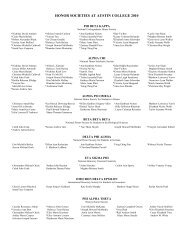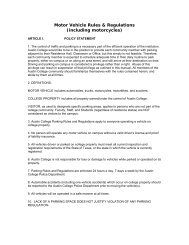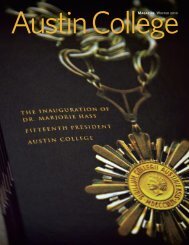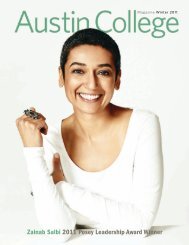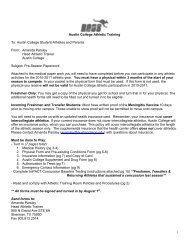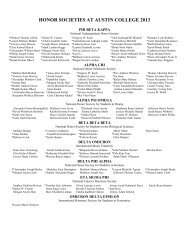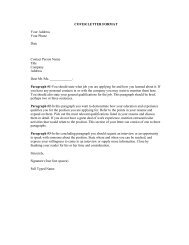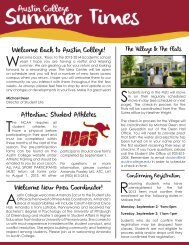You also want an ePaper? Increase the reach of your titles
YUMPU automatically turns print PDFs into web optimized ePapers that Google loves.
TEACHER EDUCATIONare associated with effective teaching. Thisfield-based (a minimum of 30 hours in a classroom)and campus-based course focuses onthree major areas — teacher-pupil interaction,pedagogical knowledge, and learner diversity.Prerequisite: Education 225 with a grade of Cor better, or permission of director of ATP toenroll in Education 225 and Education 351concurrently. (Each fall and spring)460 Advanced Directed Study(Variable course credit)464 Teaching/Learning Participation(Variable course credit)475 The Learner, the Teacher,and the CurriculumA study of and practice with planning andimplementing instruction. Education 475 studentswill be able to demonstrate knowledgeof instructional planning, classroom management,and effective teaching practices. Othertopics include curriculum, classroom communication,strategies for differentiation, andthe educational implications of brain research.Education 475 includes a nine-week teachingexperience. Prerequisite: admission to the ATP.(Each fall and spring)490 Independent Study491 Education Honors Thesis492 Independent StudyOff Campus/NSOCGraduate Courses520 Educational FoundationsIntroduction to the historical, philosophical, andsocial foundations of education. It focuses onthe following areas: (1) development of K-12 educationin the United States, (2) major ideas andschools of thought that have influenced Americaneducation, and (3) the relationship between societyand schools, with special emphasis on equity,diversity, and democratic principles. Prerequisite:Education 475. (Each spring and summer)530 Foundations of LiteracyIntroduction to beginning literacy strategies.Students closely investigate the factors whichpromote successful literacy learning. Knowledgeof the theoretical and developmental foundationsof beginning literacy provides the perspectivefor classroom practices. Observing anddocumenting emergent reading behaviors, determiningprerequisites for literacy acquisition,and structuring a developmentally appropriate,print-rich learning environment for beginningreaders are skills to be developed. This coursewill include a five-week teaching experience inthe primary grades. (Each fall and spring)531 Development of LiteracyProcesses and Competencies –survey of language arts strategiesfor upper elementary instructionSurvey of language arts strategies for upperelementary instruction. Students investigateliteracy instruction as children are developingbeyond initial reading and writing skills andstrategies. Teaching strategies to broaden anddeepen students’ fluency and comprehension,promote students’ growth as writers, documentgrowth in reading and writing, assess strengthsand weaknesses, and plan instruction from thisinformation will be the focus of this course. Thecourse will guide exploration of a meaningcenteredlanguage arts (reading, writing, listening,and speaking) curriculum for the intermediategrades (grades 4 through 8). Students willdevelop strategies that enhance all aspects ofthe language arts, but concentrate on readingcomprehension, writing competency, and thegrowth of readers and writers. Content materialand children’s literature will be used as texts.This course includes a five-week teaching experience.(Each fall, spring, and summer)532 Mathematics in theElementary SchoolPreparation of prospective elementary andmiddle school teachers of mathematics. Studentslearn to create a positive learning experiencefor their students as they acquire bothmathematical concepts and computationalskills and then apply them in problem-solvingsituations. Emphasis is placed on understandingthe developing child and the impact thatdevelopment has on instruction. Recommendationsmade by the National Council of Teachersof Mathematics and the National Councilof Supervisors of Mathematics are stressed,including use of problem solving as an integralpart of the curriculum, the importance continualassessment plays in instruction, and theintegration of technology throughout the program.The course includes a seven-week fieldexperience. Prerequisite: Education 475. (Eachfall and spring)533 Science and Social Studiesin the Elementary SchoolCombination of the curriculum of science andsocial studies as taught in elementary/middle160 | COURSES OF INSTRUCTION



